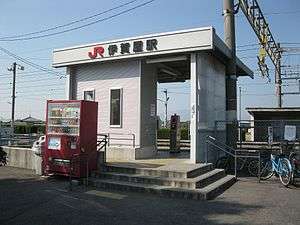Igaya Station
Igaya Station (伊賀屋駅, Igaya-eki) is a railway station in Hyōgo Town, Saga City, Saga Prefecture, Japan. It is operated by JR Kyushu and is on the Nagasaki Main Line.[1][2]
JH 07 Igaya Station 伊賀屋駅 | |
|---|---|
 Igaya Station in 2009 | |
| Location | Japan |
| Coordinates | 33°17′24″N 130°20′13″E |
| Operated by | |
| Line(s) | ■ Nagasaki Main Line |
| Distance | 20.2 km from Tosu |
| Platforms | 2 side platforms |
| Tracks | 2 |
| Construction | |
| Structure type | At grade |
| Other information | |
| Status | Unstaffed |
| Website | Official website |
| History | |
| Opened | 1 December 1928 |
| Location | |
 JH 07 Igaya Station Location within Japan | |
Lines
The station is served by the Nagasaki Main Line and is located 20.2 km from the starting point of the line at Tosu.[3]
Station layout
The station, which is unstaffed, consists of two side platforms serving two tracks. A small station building of simple concrete construction, serves as a waiting room and houses an automatic ticket vending machine. Access to the opposite side platform is by means of a footbridge.[3][2]
 View of the platforms and tracks.
View of the platforms and tracks.
History
Japanese Government Railways (JGR) opened the station on 1 December 1928 as an additional station on the existing track of the Nagasaki Main Line. With the privatization of Japanese National Railways (JNR), the successor of JGR, on 1 April 1987, control of the station passed to JR Kyushu.[4][5]
Passenger statistics
In fiscal 2016, the daily average number of passengers using the station (boarding passengers only) was above 100 and below 323. The station did not rank among the top 300 busiest stations of JR Kyushu.[6]
References
- "JR Kyushu Route Map" (PDF). JR Kyushu. Retrieved 3 March 2018.
- "伊賀屋" [Igaya]. hacchi-no-he.net. Retrieved 12 March 2018.
- Kawashima, Ryōzō (2013). 図説: 日本の鉄道 四国・九州ライン 全線・全駅・全配線・第5巻 長崎 佐賀 エリア [Japan Railways Illustrated. Shikoku and Kyushu. All lines, all stations, all track layouts. Volume 5 Nagasaki Saga area] (in Japanese). Kodansha. pp. 16, 65. ISBN 9784062951647.
- Ishino, Tetsu; et al., eds. (1998). 停車場変遷大事典 国鉄・JR編 [Station Transition Directory - JNR/JR] (in Japanese). I. Tokyo: JTB Corporation. pp. 222–3. ISBN 4533029809.
- Ishino, Tetsu; et al., eds. (1998). 停車場変遷大事典 国鉄・JR編 [Station Transition Directory - JNR/JR] (in Japanese). II. Tokyo: JTB Corporation. p. 712. ISBN 4533029809.
- "駅別乗車人員上位300駅(平成28年度)" [Passengers embarking by station - Top 300 stations (Fiscal 2016)] (PDF). JR Kyushu. 31 July 2017. Archived from the original (PDF) on 1 August 2017. Retrieved 3 March 2018.
| Wikimedia Commons has media related to Igaya Station. |
External links
- Igaya Station (JR Kyushu)(in Japanese)